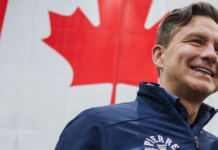Last week Public Safety Minister Ralph Goodale said the Trudeau government is looking “very, very carefully” at forcing social media companies to censor “toxic communications” on their platforms.
Goodale’s cryptic comments are just the latest refrain from a government that has continually pushed for censorship on social media — where most Canadians spend the majority of their time online.
But what exactly the Liberals’ definition of “toxic communications” or “fake news” is is still up in the air.
What is known is that the Trudeau government has a close relationship and ties with the big tech giants Google, Facebook and Twitter, and that the Trudeau government has asked these tech giants to censor content it doesn’t like.
The very day Trudeau took office his government requested Google delete Harper-era webpages from the search engine’s search results.
Has the Trudeau government made a habit of doing this over the past few years, reaching out to Google to ask the tech giant to remove undesirable content from its top search results?

Last year a parody account of Environment Minister Catherine McKenna became popular on Twitter for ridiculing the minister. Government officials then reached out to Twitter to have the account banned for impersonation.
Of course, these are just a couple of examples of the Trudeau government intervening to censor the internet that become public. There are surely many more examples that never publicly came to light.
One such example may have happened last year when Canadian political commentator and conservative libertarian Dan Dicks’ Press For Truth Facebook page was deleted without warning. Press For Truth had 350,000 followers at the time, the biggest independent conservative media outlet Facebook page in Canada. Is it that far-fetched to believe the Trudeau government may have filed complaints to Facebook about Press For Truth before Facebook deleted its page?
Could news outlets and organizations critical of the Trudeau government such as True North, The Rebel, Ontario Proud and Toronto Sun be targeted by the Trudeau government for censorship on social media?
And we’re not just talking about outright bans. In the U.S. it has been revealed that Twitter and Facebook can shadowban or downgrade content they don’t like, essentially throttling undesirable stories from being seen by users.

A little over a year in office, Liberal-connected “non-partisan” think tank Public Policy Forum (PPF) released a major research report. The report ironically inflated the fake news problem in the United States, using false and inflated data to argue in favour of a media bailout in Canada. The Liberal government commissioned PPF’s “Shattered Mirror” report and covered most of the $270,000 in costs.
Since then, Trudeau and various ministers have repeatedly made public statements about “protecting” democracy by censoring fake news on the internet, with some ministers even wondering if the government itself should play a role in policing it.
At the beginning of this year the government finally unveiled its plan to fight fake news. The Liberals announced $7 million to educate Canadians on what to think when consuming news.
But should the Trudeau government, or any government for that matter, be telling Canadians what is and isn’t legitimate news? Furthermore, should the same government be setting up a bailout that will determine which news outlets are and are not legitimate and can receive government money?
The Trudeau government itself is challenged in distinguishing fact from fiction.
Its own mandate letter tracker blatantly and incorrectly claims that the government has completed promises that it’s actually broken, such as supposedly ending the “improper use of omnibus bills.” In reality, just last year the Trudeau government snuck new legislation for deferred prosecution agreements in an omnibus bill (which looks very much like an attempt to help SNC-Lavalin get off the hook for serious bribery charges).

Retiring head bureaucrat Michael Wernick was supposed to be one of the “non-partisan” bureaucrats to be in charge of monitoring foreign interference this election. Democratic Institutions Minister Karina Gould set up the Critical Election Incident Public Protocol, which Wernick was supposed to be a part of, in order to further combat “fake news” and “orchestrated disinformation campaigns.”
But any pretence of Wernick being a non-partisan civil servant was shot after his involvement in helping the Liberal government pressure former Attorney General Jody Wilson-Raybould in the SNC-Lavalin scandal was revealed, not to mention his testimony that reeked of favouritism for the Liberals.
But what was all the more disturbing was government-designated fact-checker Wernick claiming the original Globe and Mail SNC-Lavalin story was fake news.
Should Canadians trust the powerful Wernicks and Trudeaus of this country to tell us what is and isn’t news?





















